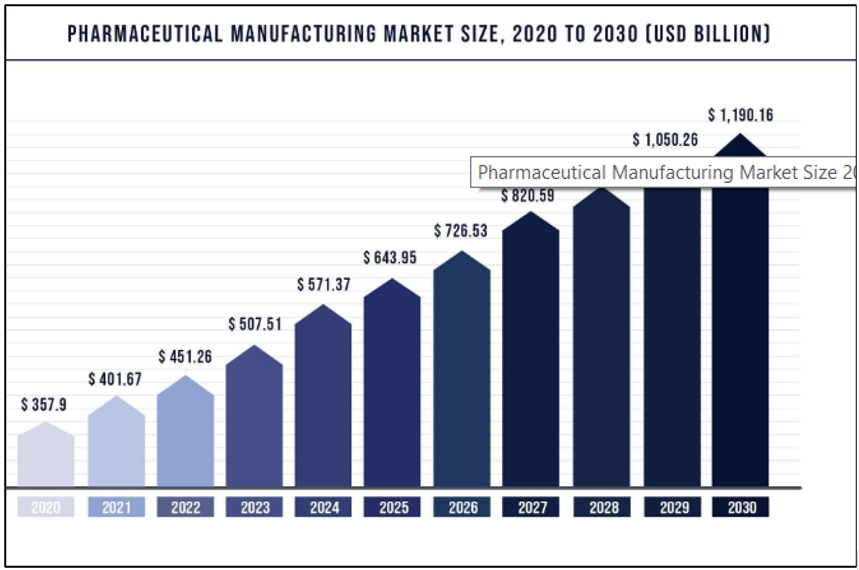The healthcare industry is a vast and complex sector encompassing various organizations, professionals, technologies, and services dedicated to maintaining and improving the health and well-being of individuals and communities. It plays a critical role in providing medical care, preventive services, research, and innovation to address a wide range of health-related needs.
The biopharmaceutical industry, also known as the biotech industry, is a sector of the healthcare industry that focuses on the research, development, and production of pharmaceutical drugs derived from biological sources. Some of the key trends include Personalized Medicine, Biologics and Biosimilars, Gene and Cell Therapies, Immuno-Oncology, Digital Health and Artificial Intelligence, shift toward Rare Diseases and Value-Based Healthcare.
Advances in genomics and precision medicine is driving the development of personalized therapies. Tailoring treatments to an individual’s genetic makeup and specific disease characteristics can lead to more effective and targeted therapies. Biopharmaceutical companies are increasingly focusing on the development of biological drugs, which are derived from living organisms and often offer greater specificity and efficacy compared to traditional small-molecule drugs. Biosimilars, which are similar versions of approved biologics, are also gaining momentum, providing cost-effective alternatives.
The emergence of gene and cell therapies is transforming the treatment landscape for various genetic and acquired diseases. These therapies involve modifying a patient’s genes or cells to correct or replace defective genetic material, offering potential cures for conditions that were previously considered incurable. Immunotherapies, particularly in the field of oncology, is making significant strides.
Therapies that harness the body’s immune system to target and attack cancer cells were showing promise in improving patient outcomes and survival rates. The integration of digital health technologies and AI in the biopharmaceutical industry is facilitating drug discovery, clinical trial optimization, and personalized patient care. AI-driven algorithms is being used to analyze vast amounts of data, identify potential drug candidates, and streamline various aspects of drug development.
There is a growing focus on rare diseases, also known as orphan diseases, which affect a small percentage of the population. Regulatory incentives and market exclusivity for orphan drugs is encouraging more companies to invest in research and development in this area. The COVID-19 pandemic highlighted the importance of vaccine development and the need for increased pandemic preparedness. The biopharmaceutical industry is experiencing accelerated vaccine development efforts and investments in technologies to respond swiftly to future infectious disease outbreaks.
The global pharmaceutical manufacturing market demonstrated a significant size, reaching USD 451.26 billion in 2022, and is anticipated to experience substantial expansion, reaching an estimated value of USD 1,190.16 billion by 2030. This growth trajectory is underpinned by a remarkable compound annual growth rate (CAGR) of 12.8% over the forecast period spanning from 2021 to 2030. The pharmaceutical manufacturing sector is poised for substantial growth, reflecting the industry’s dynamic evolution and its pivotal role in addressing healthcare needs and advancements in medical science and technology.

Some of the leading companies include, AbbVie Inc., Bausch Health Companies Inc., Gilead Sciences, Inc., Johnson & Johnson, Merck & Co., Inc., Novartis AG, Pfizer Inc., etc. In 2023, the pharmaceutical industry is witnessing several notable trends that are shaping its landscape and driving innovation:
Artificial Intelligence (AI): AI is rapidly transforming drug discovery and development processes, aiding in patient cohort identification, drug candidate prediction, and optimization. Startups like Pangaea Data and InVivo AI are utilizing AI algorithms to identify patient cohorts and enhance drug discovery efficiency.
Big Data & Analytics: High-performance analytics systems are crucial for managing the vast volumes of data generated in pharmaceutical research. Companies like Pryml and Pomicell are leveraging analytics to enable secure data collaboration and in-silico modeling for drug development.
Flexible Production: The industry is exploring flexible manufacturing methods, such as single-use bioreactors and continuous manufacturing processes, to accommodate changing market dynamics and achieve higher efficiency.
Precision Medicine: Advancements in analysis and data interpretation are driving the realization of precision medicine, tailoring treatments to individual patients. ExactCure and Tepthera are utilizing drug exposure models and individualized cancer vaccines to provide personalized medical solutions.
Additive Manufacturing: The concept of precision medicine is leading to innovations in additive manufacturing, with research focusing on 3D printing tissues, organs, and drug formulations. This technology has applications in drug development, organ engineering, and regenerative medicine, allowing for age-specific formulations and precision pills.
These trends highlight the industry’s pursuit of innovative technologies to optimize drug development, enhance manufacturing processes, and provide personalized healthcare solutions. As startups and established companies continue to collaborate and innovate, the pharmaceutical landscape is evolving to meet the demands of the future.
– Rimi Khemka (CrispIdea Analyst)
For complete coverage CLICK HERE




